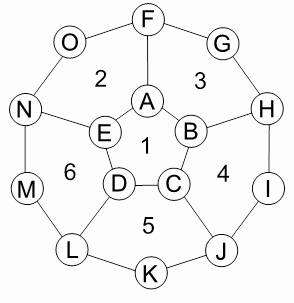Yesterday I Revisited Polyhedral Pantheon Design, a method of choosing domains (and indirectly portfolios) for gods in D&D 3.x. It is an update to Polyhedral Pantheon Design, something I wrote several years ago.
I overlooked an important part — how clerics work.
Overall they are pretty similar to the core rules. The biggest change I make is with spell knowledge.
Clerics no longer automatically know all spells on the cleric spell list. Instead they gain spell knowledge much like a wizard does.
All clerics have patron gods (priests may exist that do not, but they are not members of the cleric class). Each cleric chooses two of his god’s domains and will be able to spontaneously cast the spells of that domain, and will gain the domain powers for those two domains. Each level they gain free knowledge of three spells, picked first from the chosen domains, then the other domains of the god, then the cleric spell list. Clerics can learn additional spells in much the same way as wizards (study from a scroll, or gain through research or prayer).
That is, at first level a cleric learns the first-level spells of his chosen domains, and one more domain (if the two chosen domains have the same first-level spell, he instead learns that spell and the first-level spells from two other of his god’s domains). At second level he learns the remaining domain spells, and if there aren’t enough for three spells at this point he learns the remainder from the cleric spell list. He can also learn other cleric spells from scrolls, or through personal research and prayer. There could also be prayer books, collections of clerical spells, but since clerics still do not need them in order to prepare spells at this point I’m not sure I would have them. Costs a wizard would incur in researching or learning new spells would instead be spent in sacrifices, ritual gear (directly consumable goods such as incense, or indirectly consumable such as virgin implements).
Back in August I wrote an article on D&D Meta-Classes, and how some classes should really serve as a starting point for more concrete classes. Clerics definitely fit the bill here, so in addition to the changes made above I’d like to see god- or religion-specific changes — specifically to spells known and divine powers. However, this serves as something of a starting point.
The next post (Polyhedral Pantheons: Pathfinder Edition) should get things even closer.

Pingback: Rethinking Pathfinder Cleric Domains, Part 1 | Keith Davies — In My Campaign - Keith's thoughts on RPG design and play.
Pingback: Rethinking Pathfinder Cleric Subdomains, Part 1 | Keith Davies — In My Campaign - Keith's thoughts on RPG design and play.